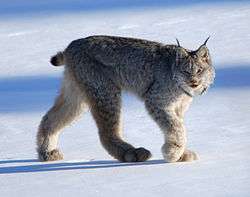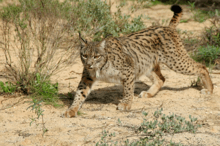Lynx issiodorensis
| Issoire lynx | |
|---|---|
| | |
| Fossils | |
| Scientific classification | |
| Kingdom: | Animalia |
| Phylum: | Chordata |
| Class: | Mammalia |
| Order: | Carnivora |
| Family: | Felidae |
| Genus: | Lynx |
| Species: | L. issiodorensis |
| Binomial name | |
| Lynx issiodorensis (Croizet & Jobert, 1828) | |
The Issoire lynx (Lynx issiodorensis) was a species of lynx that inhabited Europe during the Pleistocene epoch, and may have originated in Africa during the late Pliocene.[1] It probably became extinct during the end of the last glacial period.[1]
It is generally considered as the ancestor of all four species of lynx alive today. Its skeleton resembled that of living lynxes, but it had shorter and more robust limbs, with a larger head and longer neck. As a result, the Issoire lynx more closely resembled a typical member of the cat family than do its extant descendants.
Species descending from Lynx issiodorensis
-

Bobcat
(Lynx rufus) -

Canada lynx
(Lynx canadensis) -
Eurasian lynx
(Lynx lynx) -

Iberian lynx
(Lynx pardinus)
References
- 1 2 Sunquist, Mel; Sunquist, Fiona (2002). Wild cats of the World. Chicago: University of Chicago Press. p. 153. ISBN 0-226-77999-8.
External links
![]() Data related to Lynx issiodorensis at Wikispecies
Data related to Lynx issiodorensis at Wikispecies
This article is issued from Wikipedia - version of the Monday, January 04, 2016. The text is available under the Creative Commons Attribution/Share Alike but additional terms may apply for the media files.